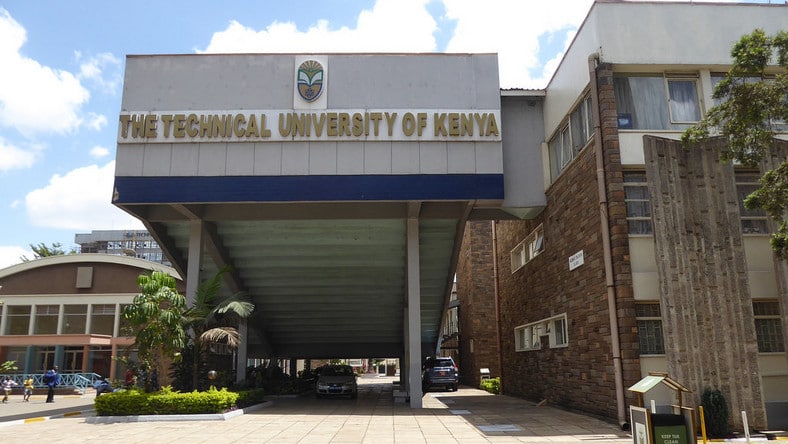Updated on July 4, 2024 – Included additional certificate and degree courses offered by TUK. Also included a conclusion and FAQs.
The Technical University of Kenya (TUK) formerly Kenya Polytechnic College was established as the first Technical University in Kenya line with the provision of the proposed Universities Act, 2012.
Currently, it is considered one of the best universities in Nairobi.TUK is located along Haile-Selassie Avenue in Nairobi next to the City Square Post Office in Nairobi.
Technical university intakes include April, August, December for short certificate courses, July for Diploma and undergraduate. And July For module II postgraduate courses as well.
Technical University of Kenya Courses
TUK offers certificate, diploma, degree and postgraduate courses including:
Certificate courses
- Certificate In Environmental Studies
- Science Laboratory Technology (Vacation)
- In Computer Engineering
- Certificate In Computer Technology
- Certificate In System Technical Support Short Courses
- Nutrition And Dietetic
- Health Records & Information Technology
- Advanced Certificate In Computer Hardware & Network Support
- Certificate In Software Development
- A Certificate In Information Technology Certificate In-Library Studies
- Advanced Certificate In Business Administration
- Certificate In Applied Electronics Certificate In Computer Servicing And Maintenance (Csm) Technician
- Certificate In Archives And Records Management
- Counselling Psychology Certificate In Information Technology
- Certificate In Civil Engineering, Certificate In Fire Engineering
- Electrical Installation Technician
- Food Technology
- Science Laboratory Technology
- Disaster Management
- Certificate In Technology Options: Certificate In Architectural Draughtsmanship, Certificate In Science Laboratory Technology (Slt),
- Distance Mode Certificate In Business Information Technology
- Advanced Certificate In Computer Technology
- Certificate In Electronics Technician Electrical Installation Electrician Craft.
- Distance Mode Certificate in Business Information Technology
- Advanced Certificate in Computer Technology
- Certificate in Electronics Technician
- Electrical Installation Electrician Craft
TUK Diploma Courses
They include
- Diploma In Technology In Mechanical Engineering Options
- Technology In Mechatronic Engineering
- Diploma In Architecture.
- Geological Science.
- Diploma In Technology In Atmospheric Science.
- Applied Chemistry (Analytical Chemistry).
- Technology in Disaster Management
- International Relations And Diplomacy
- Social Work And Community.
- Development Diploma In Printing And Packaging
- Diploma in Printing Technology
- Higher Diploma in Printing Technology
- Quantity Surveying
- Quantity Construction Management.
- Urban And Regional Planning
- Diploma in Biochemistry
- Diploma in Technology: Molecular Biology And Biochemistry.
- Secretarial Studies
- Diploma in Management
- Banking
- Fashion Design And Garment Making
- Journalism And Public Relations
- Diploma in Music
- Information System.
- Communication & Computer Networks among other courses
TUK Degree Courses
They include
- Degree In Architecture
- Degree In Management Of Built Environment In Real Estate Or Urban Design In Kenya.
- Quantity Surveying
- Engineering
- Degree In Building Construction
- Degree In Land Policy And Administration.
- Degree In Fine Arts
- Degree In Tourism And Traveling Management.
- Degree In Hotel Management
- Degree In Music
- Degree In Engineering.
TUK bachelor’s degree courses
They comprise of
- Bachelor Of Technology In Communication And Computer Networks Technology, Civil Engineering and Bachelor Of Engineering In Civil Engineering.
- B.E in Electronics And Computer Engineering, Applied Chemistry (Industrial Chemistry) and biochemistry.
- Bachelor Of Technology (Telecommunications, survey engineering, Environmental Resource Management, Power Systems, Instrumentation and Control and Applied Chemistry (Industrial Chemistry).
- Bachelor Of Philosophy In Technology Industrial Chemistry, Analytical Chemistry and Instrumentation And Control. And in food technology.
- B.E in Geospatial Engineering
- Bachelor Of Philosophy Printing, Construction Management
- B.S In Tourism And Travel Management
- Philosophy In Technology (Analytical Chemistry)
- Biotechnology:- (Industrial, Medical, And Agricultural Options)
- Bachelor Of Technology (Technical And Applied Physics), Food Science and design.
- B.A in Food Technology
- Bachelor Of Technology In Journalism And Mass Communication
- B.A in Event And Convention Management
- Bachelor Of The Built Environment (Urban And Regional Planning)
- Bachelor Of Technology (Technical And Applied Physics), Health Information Technology and Information Studies
- B.A in International Relations And Diplomacy
- Bachelor Of Technology In Event And Convention Management
- B.B.A in Office Administration (B. Tech. Oa)
- Bachelor Of Arts In Legal Studies Bachelor Of Technology In Business Information Technology Bachelor Of Economics among others.
TUK postgraduate studies
- Master Of Technology In Mechanical Engineering Technology Applied Statistics Mathematical Statistics Mathematics (Pure And Applied Mathematics)
- Postgraduate degree in Environmental Resource Management School Of Biological And Life Sciences
- Applied Parasitology
- Master Of Philosophy In Applied Parasitology Master Of Science In Applied Parasitology
- Science In Forensic Biochemistry Master Of Science In Applied Linguistics
- Studies in Information And Knowledge Management Master Of Arts In Entrepreneurship
- Business Administration Masters Of Science In International Relations
- M.A in Music In Music Education
- Music In African Music Studies Masters Of Musical Arts In Composition and Master Of Musical Arts In Performance
Related: Technical University of Kenya July 2019 Intake
Technical University Cluster points
Cluster points directly affect student’s eligibility for a particular course. At TUK, cluster points necessitate the need for students to determine their cluster points before settling on a particular course of study.
Cluster points normally influence the grading system. TUK cluster subjects are classified according to groups.
They comprise of
Group I ( Compulsory 3)
- Mathematics
- English
- Kiswahili
Group II (At least two 2)
- Physics
- Chemistry
- Biology
Group III ( At least one 1)
- Geography
- CRE
- History & Govt
- Hindu Rel. Ed
Group IV Aviation
- Comp Studies
- Woodwork
- Metal Work
- Electricity
- Art and design
- Power mechanics
- Building and Construction
Group V German
- Arabic
- French
- Business studies
- Music
TUK Cluster points can be calculated using the formula below with the main critical denotations represented.
w=√(r/m*api/spi)*48
w Weighted Cluster Point
c Raw Cluster Point
an Aggregate Cluster Point.
m Maximum performance index per cluster for all students and subjects
r Raw cluster performance index per cluster for all subjects enrolled
API Aggregate performance index
spi Maximum performance index
Related: Technical University of Kenya fees structure
Technical University Courses and Cluster Points Conclusion
Each year during course revision KUCCPS provides a list of cluster subjects for universities.
For one to qualify for a certain course there are a number of points you have to achieve in the four (4) subjects that are considered the most relevant for the course.
All academic course offered in higher learning institutions requires a minimum of four primary subjects. Thus, cluster point calculation encompasses these subjects irrespective of its group.
Cluster points are calculated using four grading subjects concerning the course cluster points. The average grading points include A 12, A- 11, B+ 10, B 9, B- 8, C+ 7, C 6, C- 5, D+ 4, D 3, D- 2, E 1
Subject Grade Grading points
- Mathematics A- 11
- Physics B- 8
- B 9 Chemistry
- Business Studies A- 11
- 39 -raw cluster points
FAQs – Technical University of Kenya Courses and Cluster Points
What courses does the Technical University of Kenya offer?
The Technical University of Kenya offers a wide range of courses including certificate, diploma, undergraduate, and postgraduate programs in various fields such as engineering, technology, business, arts, and sciences.
How are cluster points calculated at the Technical University of Kenya?
Cluster points at TUK are calculated based on a grading system that assigns specific points to different subjects. The total cluster points are determined by the performance in four primary subjects relevant to the chosen course of study.
When are the intakes for new students at the Technical University of Kenya?
Intakes for new students at TUK occur in April, August, and December for short certificate courses, and in July for diploma, undergraduate, and postgraduate module II programs.
What are the main groups of subjects considered for cluster points at TUK?
The main groups of subjects for cluster points at TUK include Group I (compulsory subjects such as Mathematics, English, and Kiswahili), Group II (subjects like Physics, Chemistry, and Biology), Group III (additional subjects like Geography, CRE, and History), and Group IV (subjects related to technical and vocational skills).
How does TUK ensure students are placed in appropriate courses based on cluster points?
TUK employs a rigorous cluster points system to ensure students are placed in courses suited to their academic strengths and interests. This system considers the performance in relevant subjects and determines eligibility for specific courses.
Conclusion
The Technical University of Kenya stands as a beacon of academic excellence, offering a diverse array of programs spanning numerous disciplines. Its robust cluster points system serves as a guiding mechanism, ensuring that students are matched with courses that align with their academic abilities and passions.
Through its unwavering dedication to excellence and innovation, TUK not only enriches the educational landscape of Kenya but also influences the broader sphere of higher education. The Technical University of Kenya Courses and Cluster Points exemplify its commitment to fostering intellectual growth and shaping the future leaders of tomorrow, both locally and globally.




